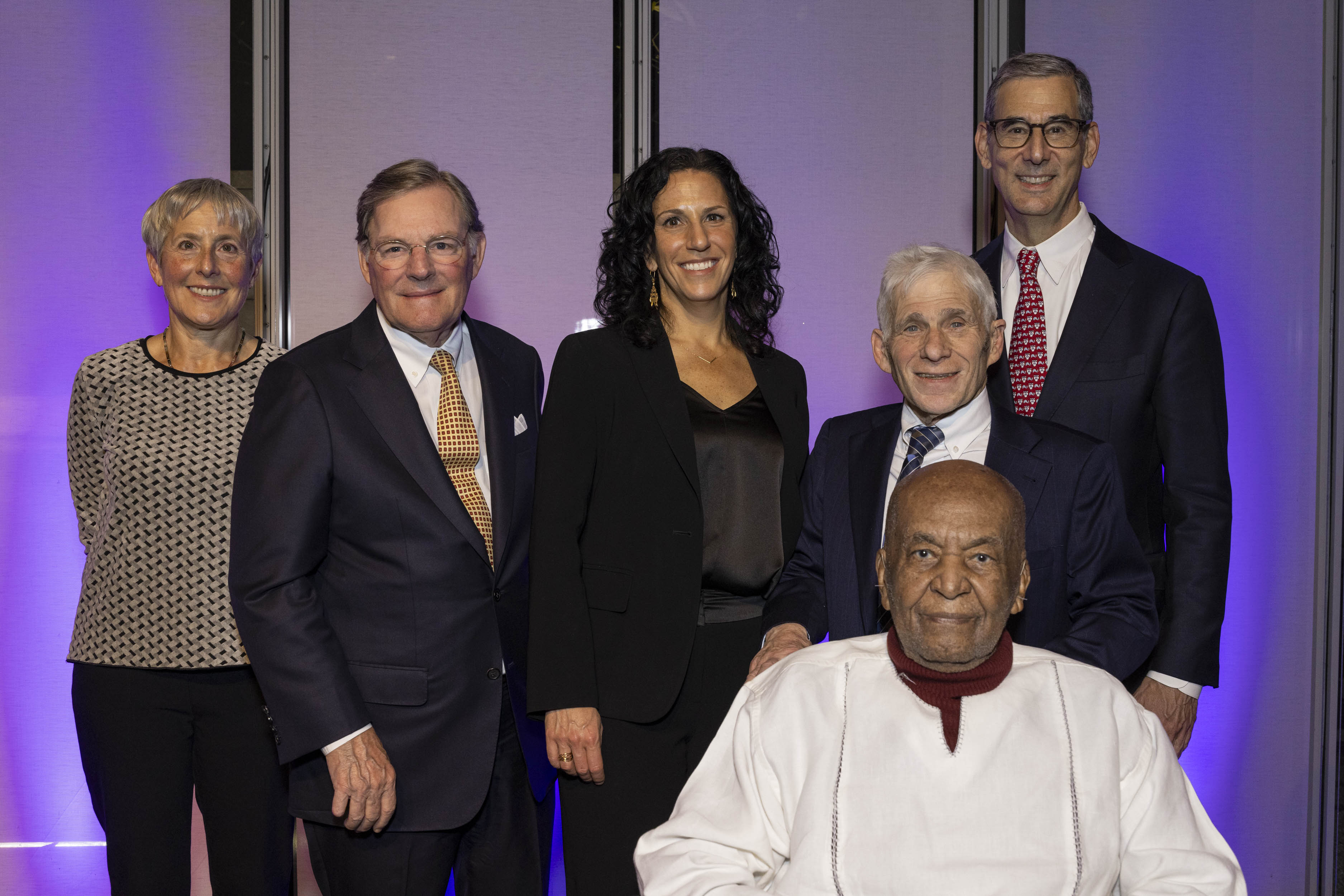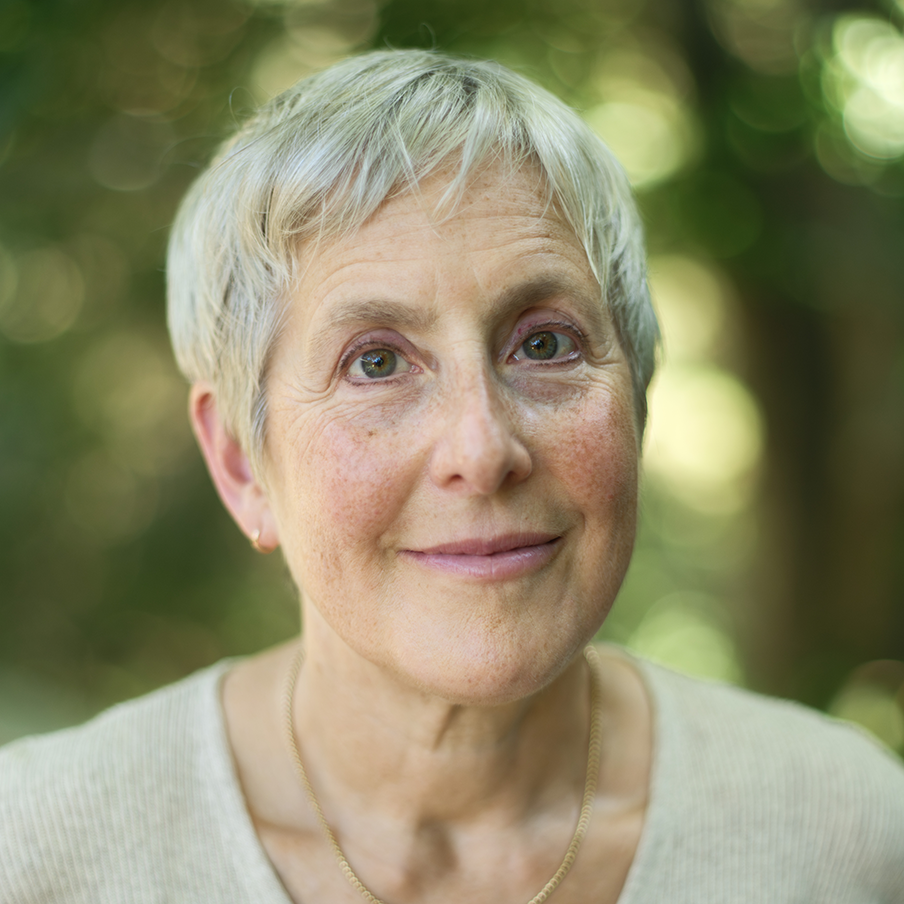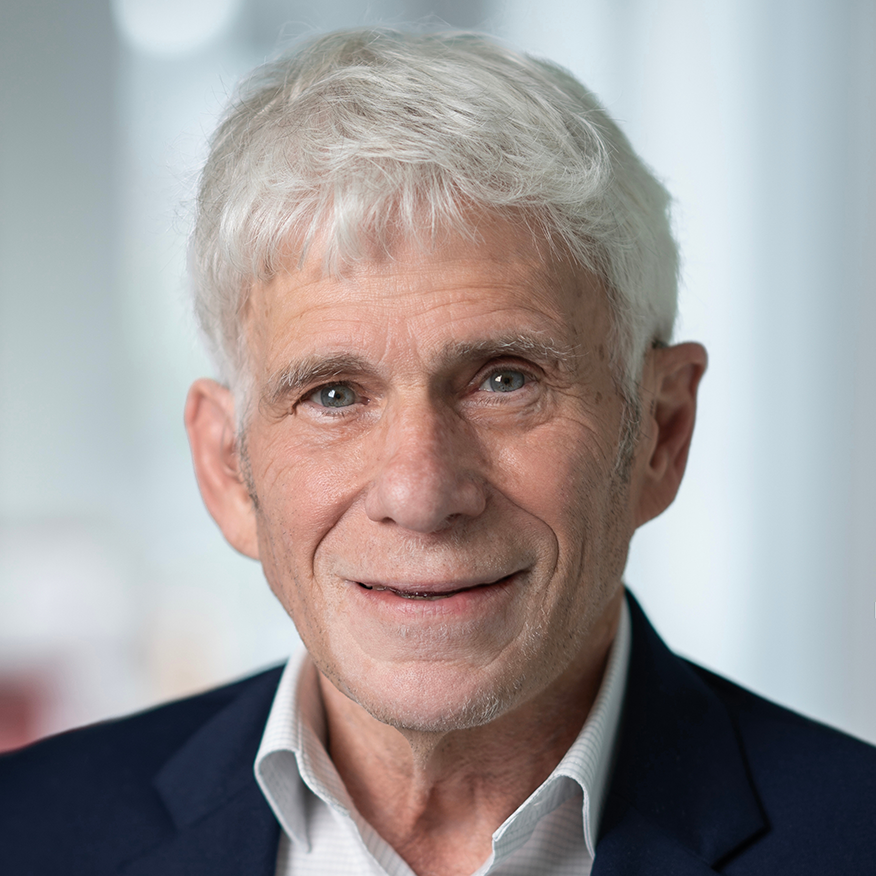News & Events
‘I think that there is no higher calling’: 2024 McGraw Prize in Education winners see the impact of their work

At the 2024 Harold W. McGraw, Jr. Prize in Education Nov. 13 celebration, from left, Jody Lewen, Harold McGraw III, Penn GSE Dean Katharine Strunk, Robert Lerman, Edmund W. Gordon, and GSE Vice Dean of Innovative Programs and Partnerships Michael Golden.
Edmund W. Gordon — the architect of the Head Start program, an educator who challenged outdated ideas about how to teach and assess learners of all ages, a mentor who counseled generations of education leaders — has dedicated most of his 103 years to transforming education.
In accepting the Harold W. McGraw, Jr. Prize in Education on Nov. 13 at the Morgan Library & Museum in New York City, he laid out the stakes for his life’s work and that of his fellow honorees, Robert Lerman and Jody Lewen.
“I think that there is no higher calling than that of helping in the cultivation of human intellective competence and character,” Gordon said. “The human brain is perhaps the finest expression of matter known to mankind. What else in the entire universe appears capable, on proper stimulation, of producing human thought? What other than the cultivated human brain seems capable of converting mere conceptions into reality?”
Gordon, Lerman, and Lewen were recognized with the 2024 McGraw Prize in Education for their groundbreaking work in helping learners cultivate their minds and improve their lives. Gordon, the Pre-K–12 winner, was praised for his decades of service, which continues. Lerman, the Lifelong Learning winner, has pushed Americans to rethink how we prepare people for careers. And Lewen, the Higher Education winner, is at the forefront of a new movement in prison education.
Based at the University of Pennsylvania Graduate School of Education, the McGraw Prize is the most prestigious prize in education. Each winner receives a Prize sculpture and $50,000 and is honored at a celebration in New York City. Gordon, Lerman, and Lewen join a distinguished list of more than 100 teachers, professors, superintendents, university presidents, nonprofit leaders, entrepreneurs, and public officials who have shaped the education landscape.
Harold McGraw III, former chairman, CEO and president of The McGraw-Hill Companies, said this year’s winners represent educators everywhere who are doing remarkable work and overcoming obstacles to deliver quality education to children and adults everywhere.
The awardees were submitted for consideration by their peers. Winners were then selected during three rounds of judging, including a final round by an independent panel of esteemed leaders in the field. Nominations for the 2025 McGraw Prize in Pre-K–12 learning, higher education, and lifelong learning are now open.
“Your extraordinary work truly enriches the legacy of the McGraw Prize and speaks to our hopes for the future of education,” said Penn GSE Dean Katharine Strunk. “It is no exaggeration to say that, through your pioneering efforts and steadfast commitment, you haven’t just met the moment for education — you’ve made the moment.”
Lerman, co-founder of Apprenticeships for America and a fellow at the Urban Institute, has extended learning opportunities to those who want to tackle postsecondary pursuits through experiential learning and alternative pathways.
In accepting his award, he gave a history lesson. When Lerman first started studying apprenticeships in the 1980s, he was skeptical, seeing them as restricting entry into jobs. But over time, he came to see that they engaged students in the context of real work far better than an “academic only” approach.
“I believe that apprenticeships at scale can change the nature of work for many Americans, raising their earnings but also pride in their occupational expertise,” Lerman said. “With the self-esteem that comes with accomplishment, more Americans would feel good about themselves and the country.”
Noting that surveys routinely show the public believes higher education needs to align more closely with career development and employers want better-prepared workers, Lerman called for greatly expanding apprenticeship programs.
“I’ve proposed three key steps to scaling up apprenticeships: One, tackle the toughest part — convincing employers to dive in. Let’s provide financial incentives to organizations that sell employers on apprenticeship and implement programs but pay only for new apprenticeships,” Lerman said. “Two, establish credible occupational standards to ensure apprentices reach high levels of competency in their fields. And three, fund quality instruction for the classroom portion of apprenticeships.”
Lewen recognized the power of higher education in prison soon after she began volunteering as an instructor at a college program at San Quentin Rehabilitation Center. Her experience inspired her to become the founder and president of what became Mount Tamalpais College, an accredited independent institution offering hundreds of incarcerated individuals access to a liberal arts associate degree, as well as intensive college preparatory programs, and student support services.
"We need to foster a culture within ourselves and within our institutions that allows people to literally break ranks. Stepping up and modeling unapologetic bridge-building is the essence of leadership,” Lewen said. “Innovation is not just about strategies, solutions, or practices, it's about what we're willing to question, what taboos we are willing to violate, and what risks we're prepared to take — for the public good. We urgently need a revolution of both courage and imagination in ourselves, in our institutions, and in our society. My deepest thanks to all of you for lighting the way."
Mount Tamalpais provides comprehensive individualized academic advising and support, particularly for students with learning challenges. Despite not receiving any state or federal funding, the college charges no fees or tuition, and all school supplies and textbooks are provided free of charge.
Lewen is also a co-founder of the Alliance for Higher Education in Prison, a national network supporting education for incarcerated students. She serves as a trusted advisor to policymakers and has provided consulting to dozens of prison education programs nationwide.
Gordon — a distinguished emeritus professor at Yale University and Teachers College, Columbia University, and director emeritus of the Gordon Institute for Advanced Study at Teachers College — was an early champion of supplemental education in its many forms.
He served as the original director of research and evaluation for the Head Start program under President Lyndon Johnson. In that role, he emphasized that each student deserves sufficient opportunities and support to thrive academically and developmentally.
Throughout his career, his work has significantly influenced education policy, advocating for reforms that address systemic inequities and promote social justice in schools. His insights have informed the development of instructional strategies, curriculum materials, and teacher training programs aimed at fostering inclusive learning environments.
Gordon’s influence continues to shape the education policy and research landscape. In accepting his McGraw Prize, Gordon said he was fortunate to have the opportunity to have a life in education.
“When we think of our profession as being responsible for the deliberate cultivation of intellective competence and character,” Gordon said. “It is not difficult to understand why I feel that it is such an honor for me to be thought of as one who has done education well.”





